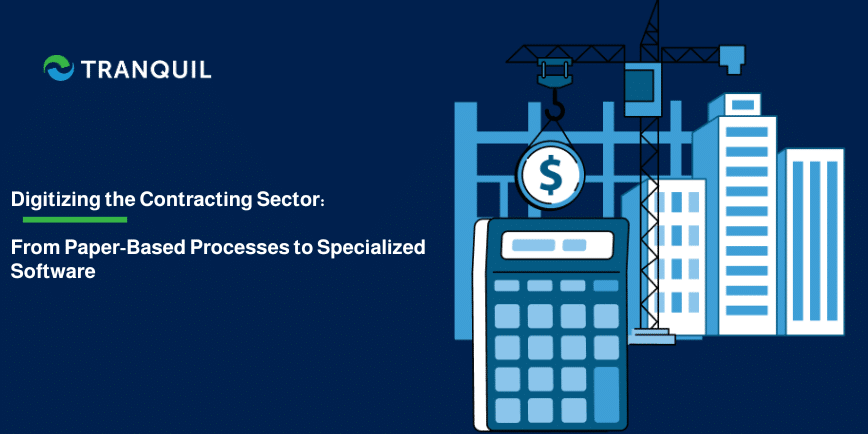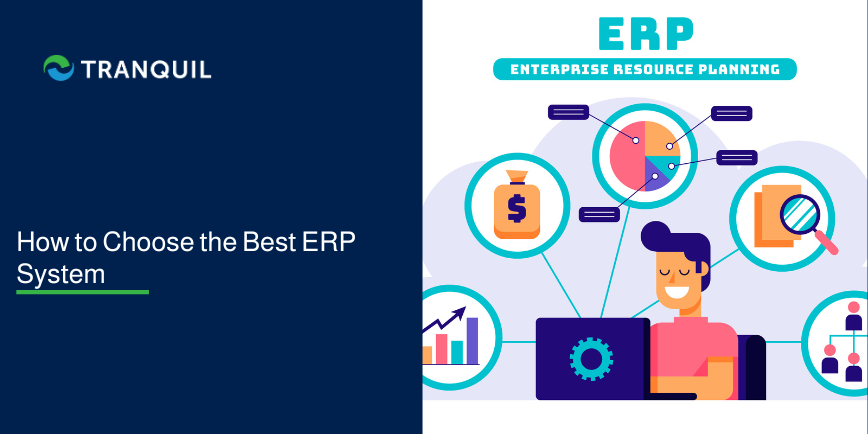
Digitizing the Contracting Sector: From Paper-Based Processes to Specialized Software
Cloud ERP for Construction Companies is no longer a luxury—it’s a necessity. With the rapid pace of technological advancement, digitizing sectors is essential to improve efficiency and stay competitive. The contracting industry, facing complex operational and financial challenges, is among the sectors most in need of transformation
Among the most powerful tools enabling this shift is the cloud-based ERP system, which streamlines operations, reduces costs, and significantly enhances productivity across real estate and construction projects.
A Historical Glimpse into Digital Transformation in Saudi Arabia and Bahrain
Both Saudi Arabia and Bahrain have prioritized digital transformation as a national goal. For example, Saudi Arabia launched its Vision 2030 in 2016, placing digital transformation as one of its foundational pillars. Similarly, Bahrain initiated a pioneering digital strategy in 2007 and updated it in 2021 to align with emerging trends such as artificial intelligence (AI) and the Internet of Things (IoT). These strategies were not merely theoretical plans—they were carefully studied and implemented with specific execution timelines.
Saudi Arabia expanded its data center infrastructure and launched advanced initiatives like e-invoicing, mandated by the Zakat, Tax and Customs Authority (ZATCA). Meanwhile, Bahrain became one of the first Arab countries to host AWS cloud services in 2019. These developments created a solid foundation for digitizing various sectors—chief among them, the contracting sector, which urgently requires modern tools and systems to increase productivity and reduce operational costs.
Despite its importance, the digitization of the contracting sector has lagged behind others like healthcare and banking. This delay is largely due to the sector’s unique challenges, such as complex contracts and poor interdepartmental integration. These issues made digital transformation difficult and highlighted the need for robust digital solutions like cloud-based ERP systems to manage large-scale construction projects.
What is Cloud ERP and What Is Its Role in the Contracting Sector?
ERP (Enterprise Resource Planning) is a comprehensive software system that integrates various core business processes such as project management, inventory control, human resources, accounting, and more.
The purpose of this unified system is to provide a single platform for all project-related data—saving time, effort, and money.
Cloud ERP functions similarly to traditional ERP, with the key difference being that it is hosted on external cloud servers. This means companies don’t need to purchase dedicated hardware, as the system can be accessed from anywhere via the internet.
Due to their complexity, large-scale construction and real estate projects often face multiple challenges—such as overlapping tasks and simultaneous projects. That’s why construction companies need an ERP system that consolidates all data into one platform and seamlessly connects workflows across departments. This interdepartmental integration significantly improves operational efficiency and reduces overall project costs.
Simply put, ERP systems enable project managers to track all project information in real time, helping them make fast, informed decisions based on continuously updated data. This prevents task duplication and conflict, ensuring smooth project execution without the delays typically caused by outdated administrative methods.
Moreover, cloud ERP allows managers to access necessary data anytime and from anywhere—unlike traditional construction operations, where administrative systems require returning to the office to retrieve information, which wastes time and effort.
Benefits of Cloud ERP for Construction Companies in Saudi Arabia and Bahrain
Cloud ERP systems have a positive impact on construction companies in Saudi Arabia and Bahrain, offering numerous benefits, including the following:
Better Project and Cost Management
Because a cloud-based ERP system consolidates various departments of a project into a unified platform, it significantly enhances project management. It enables decision-makers to track real estate project expenses in real time, allowing them to generate instant, detailed reports that help identify areas where costs can be reduced and profitability improved.
To better understand this, consider a large construction company undertaking a project to build 10 apartment buildings in a new residential area. Executing such a project requires significant and complex expenses. Without an ERP system, each department works in isolation with no integration or oversight, often resulting in rising costs without a clear understanding of the root cause.
However, with an ERP system, everything changes. Thanks to detailed, real-time reports automatically generated by the system—without the need for manual data compilation—the company’s management, for instance, might discover that one supplier is offering a specific material at a higher price than another. This enables the team to immediately switch to the more affordable supplier. As a result, costs could drop significantly—potentially by more than 12%.
Easier Human Resources and Inventory Management
A cloud-based ERP system offers fast, automated tools for tracking employee working hours, optimizing task allocation, and managing payroll—positively impacting workflow efficiency and ensuring employees are performing effectively. On the other hand, it also enables the company to monitor materials and resources in storage, leading to more efficient inventory management.
The following example illustrates the importance of such a system for HR management: in large construction companies, managing human resources is far from simple due to the variety of departments and shifts. Monitoring attendance and processing payroll demands significant time and effort. Here, the role of a cloud ERP system becomes crucial—it records attendance, absences, and clock-ins in real time. As a result, the accountant can view an employee’s full record and process their salary with just a single click.
Solving Common Challenges Faced by Construction Companies
Construction firms face numerous challenges—ranging from managing multiple projects and handling financial complexities to difficulties in coordinating teams. This is where a cloud-based ERP system plays a transformative role. By centralizing all project data onto a single platform, it enables managers to access real-time insights with just one click. This streamlined access improves project productivity and significantly reduces wasted costs.
Enhancing Strategic Decision-Making
ERP systems do more than just deliver accurate real-time data—they also provide decision-makers with forward-looking forecasts. This empowers leadership to develop highly precise strategic plans, ultimately improving project productivity and minimizing errors to the greatest extent possible.
Ensuring Compliance with Laws and Regulations
This advanced cloud-based ERP system supports adherence to accounting standards and ensures alignment with local real estate laws. For instance, both Saudi Arabia and Bahrain impose Value Added Tax (VAT) on construction projects. The ERP system tracks workflows in accordance with these legal requirements, helping companies avoid violations and maintain full regulatory compliance.
Integration with Engineering Design Systems
Some modern ERP systems can seamlessly integrate with advanced engineering design software. This integration bridges the gap between planning and execution, ensuring high work accuracy and quality. It also prevents data loss or duplication during project implementation—an essential factor for real estate and construction companies.
Reducing Workplace Injuries and Enhancing Worker Safety
Construction sites have long been prone to serious accidents, often resulting from poor coordination and lack of timely information. However, companies using advanced ERP systems have seen a reduction in such incidents. These systems help prevent task overlaps and site congestion—two leading causes of onsite injuries. Moreover, ERP systems can detect equipment malfunctions in real time, providing immediate alerts to onsite personnel and enhancing overall safety.
Challenges That May Arise During Implementation
- High Implementation Costs
The initial cost of implementing an ERP system can be significant due to expenses related to software development, employee training, licenses, and ongoing technical support. - Employee Resistance to Change
Employees often resist new systems out of fear—either of losing their jobs or struggling to adapt to unfamiliar technologies. Managing this resistance requires effective change management and training. - Lengthy Implementation Timeline
Deploying a cloud ERP system in construction companies can take several months to a year, especially given the sector’s complex organizational structure and legacy systems that need replacing. - Selecting the Right ERP System
With many ERP solutions on the market, companies must carefully evaluate and compare systems to ensure they select one that aligns with their specific operational needs and goals. - Data Migration Difficulties
Migrating from legacy systems to a cloud-based ERP requires precision and expertise. Errors in data transfer can lead to system malfunctions and inaccurate outputs, making expert oversight essential.
How Construction Companies Can Begin Their Transition to a Cloud ERP System
-
Conduct a Detailed Company Analysis
Begin by identifying the company’s specific needs, development areas, and operational challenges. This assessment helps determine the most suitable ERP system based on actual requirements.
-
Select the Right ERP Provider
Choose an ERP vendor based on well-defined criteria—not randomly. The selection should be grounded in proven experience, industry relevance, and the ability to offer tailored solutions.
-
Train Human Resources on the New System
Prepare your employees for the transition by providing adequate training on the cloud ERP system. This helps them adapt to new workflows and utilize the system effectively.
-
Implement the System Gradually
A phased rollout eases employee acceptance and minimizes disruption. Gradual implementation allows teams to adjust and prevents resistance associated with abrupt changes.
-
Ensure Ongoing Monitoring and Evaluation
Implementation is only the beginning. Continuous monitoring, evaluation, and feedback collection are essential to refine system performance and maximize benefits over time.
The cloud ERP system represents a significant step forward in the evolution of construction companies. It not only enhances productivity but also reduces costs. However, successful implementation requires a deep analysis of the company’s current situation and the careful selection of a qualified partner capable of executing the system professionally. As the saying goes, “The right person in the right place” is the first and most important rule for success.



